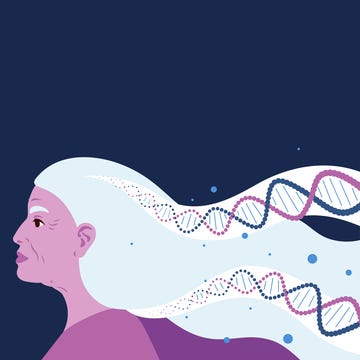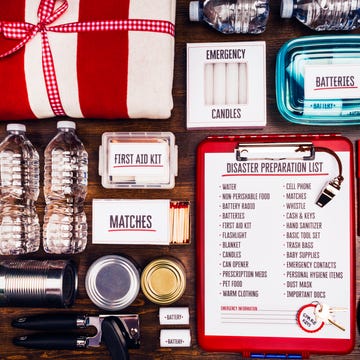When my dad, Michael Moseley, was diagnosed with type 2 diabetes in his 50s he was shocked; but when he managed to reverse that diagnosis by losing 9kg with his now famous 5:2 diet, it was a great relief. Over the next 12 years, he and my mum worked together to follow the emerging evidence as the science of weight loss evolved and created the programme known as The Fast 800 – now widely used around the world. Dad was fascinated by the potential of weight-loss drugs, but had significant reservations, which I share. With demand so high, large parts of the market are like the Wild West. People with obesity-related illnesses are self-administering the drug, and increasing their dose to very high levels without medical or nutritional support. It was an area Dad was passionate about and I think he would have written this book if he were still alive.
My dad has been a huge influence on me. Throughout our childhood, he was always doing slightly weird and wacky things. I think other parents probably weren’t consuming tapeworms and having them live in their stomach for 10 weeks. We even had a pet leech at one point. He was always doing things that pushed him outside his comfort zone and that terrified him, from bungee jumping to caving. But the thing he probably cared most about was changing people’s lives through weight loss.
A lot of his passion has rubbed off on me. Like my parents, I’m medically trained and fascinated by lifestyle medicine. For many years, my focus has been on treating obesity. It’s so important that people are well informed about what makes a healthy diet, and about the risks and benefits of these drugs. In fact, the lack of support for people taking the drugs and the lack of advice about what to eat is the reason I wrote my book: Food Noise: How Weight Loss Medications & Smart Nutrition Can Silence Your Cravings.
What is food noise?
The huge rise in popularity of weight-loss jabs has brought a new phrase into our vocabulary – ‘food noise’, the internal chatter many people experience when it comes to food and hunger. Food noise refers to your cravings; those intrusive thoughts that tell you to eat that chocolate bar, to have those crisps, even when you know it may not be the best thing for you. It’s so incessant and intrusive that it drives overeating.
One of the ways weight-loss drugs work is to reduce your appetite and cut down this food noise. The way I like to think of them is as soundproof ear defenders. When you’ve taken the drugs, you have your soundproof ear defenders on, so you can go about your life and are mostly able to avoid temptations.
But weight-loss drugs are a tool, like anything else. When you take off those ear defenders – when you stop taking the medication – that food noise can return with a vengeance. Your appetite comes rushing back.
The hidden side-effects
Weight-loss medications are very powerful drugs and they should not be taken lightly. While they’ve been around for almost 20 years as a treatment for type 2 diabetes, we don’t have really long-term data on how this could affect the population, especially at these higher doses. It’s all very new. And there are certain things we need to be extremely careful of when we’re dealing with a drug that has been such a blockbuster hit.
Some people can experience side-effects related to the gut – nausea, vomiting, diarrhoea and constipation. There can also be more serious complications, such as gastroparesis – a condition sometimes referred to as ‘stomach paralysis’ – and acute pancreatitis, a nasty, painful and potentially fatal condition when the pancreas becomes inflamed. Rapid weight loss is known to increase the risk of gallstones and this appears to be true of weight-loss injections, too.
But when I wrote the book, I also wanted to think about some of the long-term consequences that we’re not necessarily talking about. We currently have a diet where we’re overfed but undernourished. In fact, 50% of people who are obese also have some degree of micronutrient deficiency. One of my biggest worries is that throwing weight-loss drugs into the mix could worsen the malnutrition issue.
When people reach for an unsupervised prescription for a weight-loss jab, they typically halve or even quarter their consumption of food. But this can mean continuing to eat unhealthy food, just in smaller quantities. They might lose weight, but they will be putting themselves at serious risk of malnutrition.
Then there’s muscle loss. Muscle is important not just for looking good, but metabolically. It uses up a lot more calories than fat. It’s really important as a ‘glucose sink’, sucking up a lot of the sugar in your blood. Longer term, it’s crucial for mobility and reducing frailty in older age. The harsh truth is that most of us reach peak muscle mass between the ages of 30 and 35, and then things start to decline gradually throughout our 40s. At 50, the ageing process really kicks in and you’re likely to see a more rapid decline in lean muscle and strength. By the age of 60, decline in muscle mass accelerates yet further, to more than 10% loss per decade.
One thing we do know is that unless efforts are taken to preserve muscle, you could see significant muscle loss while taking weight-loss medication. And there’s another issue, too. After any rapid weight-loss diet, or a period on weight-loss jabs, you may eventually return to your pre-diet weight. If you repeat the diet, or go back on the jabs, you could end up losing more muscle each time, and gaining more fat as the weight returns. How to eat well on (and off) the drugs
There are two things that drive us to eat. One of them is hunger – when you’re hungry, you want to eat. And the other is reward; we can all think of times where we’re not that hungry, but just want something sweet or salty. The weight-loss injections work by reducing both hunger and reward – and one of the challenges with coming off the drugs is that not only does your hunger come back, but you also have the return of food noise. That’s why, to gain the most you can out of the weight-loss medications, you can’t just stick a needle in your tummy and hope for the best. Dietary and lifestyle support is crucial.
A very nutritious diet is important. I don’t think people will be surprised to hear this, because my parents always talked about it, but a Mediterranean-style diet is one of the best researched dietary patterns in the world, providing healthy fats, such as olive oil and oily fish, wholegrains, legumes and plenty of fruit and vegetables, plus a little bit of dairy and some meat. You can also follow it if you’re a vegetarian or vegan.
I’m hopeful that most people will not need to be on these drugs for life, but will use them to kick-start a healthy weight-loss journey. If you strive to make improvements in your diet, focusing on eating real and filling, nutritious foods and exercising regularly, the weight-loss jabs can find a healthy place in the mix.
Food Noise: How Weight Loss Medications & Smart Nutrition Can Silence Your Cravings (Short Books) by Dr Jack Mosley, out 24 April














